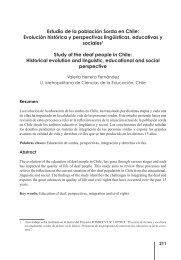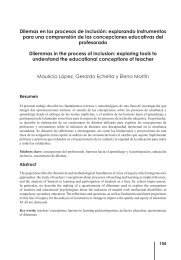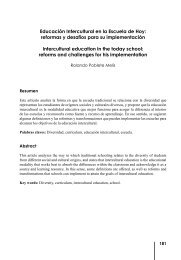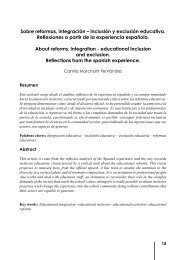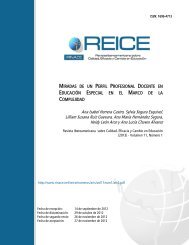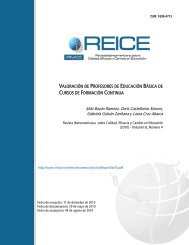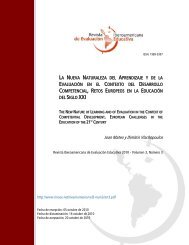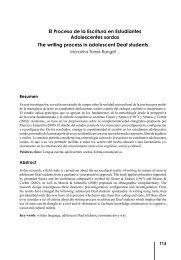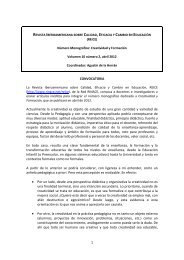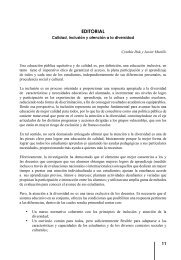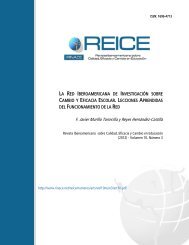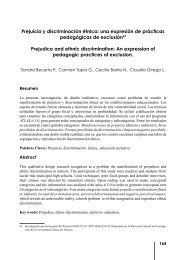Joaquín Caso Niebla y Laura Hernández Guzmán - Red ...
Joaquín Caso Niebla y Laura Hernández Guzmán - Red ...
Joaquín Caso Niebla y Laura Hernández Guzmán - Red ...
Create successful ePaper yourself
Turn your PDF publications into a flip-book with our unique Google optimized e-Paper software.
158<br />
Modelo explicativo del bajo rendimiento escolar: Un estudio con<br />
adolescentes mexicanos<br />
<strong>Joaquín</strong> <strong>Caso</strong> <strong>Niebla</strong> y <strong>Laura</strong> <strong>Hernández</strong> <strong>Guzmán</strong><br />
Lammers, W., Onweugbuzie, A. & Slate, J. R. (2001). Academic success as a function of gender, class,<br />
age, study habits, and employment of college students. Research in the schools, 8(2), 71-81.<br />
Lane, C., Marquardt, J., Meyer, M. A. & Murray, W. (1997). Adressing the lack of motivation in the middle<br />
school setting. Master´s Action Research Project. U.S. Illinois: Saint Xavier Universtity.<br />
Lerner, R. M. (2001). Concepts and theories of Human Development. Lawrence Erlbaum Associates.<br />
Litten, K. (1999). A prevention program design for inner-city, high school adolescents to combat learned<br />
helplessness and depression. Dissertation Abstracts International, 60(3-B), 1306.<br />
Lupart, J. L., Cannon, E. & Telfer, J. A. (2004). Gender differences in adolescent academic achievement,<br />
interests, values and life-role expectations. High Ability Studies, 15(1), 26-42.<br />
Méndez, R. (2003). Curso de Integración y adaptación escolar. Manual del Alumno. México: Dirección<br />
General de Orientación y Servicios Educativos, UNAM.<br />
Nelson, J., Smith, D. & Dodd, J. (1992). The effects of teaching a summary skills strategy to students<br />
identified as learning disabled on their comprehension of science test. Education & Treatment of<br />
Children, 15(3), 228-243.<br />
Osorno, G.P., Crespo, C., Arjona, S. & Romero, P. (2003). Taller Proyecto de Vida. Manual del Alumno.<br />
México: Dirección General de Orientación y Servicios Educativos, UNAM.<br />
Osterman, K. (1998). Student community within the school context: A research synthesis. Ponencia<br />
presentada en: Annual Meeting of the American Educational Research Association. San Diego, April<br />
13-17.<br />
Owens, T.J. (1994). Two dimensions of self-esteem: Reciprocal effects of positive self-worth and selfdepreciation<br />
on adolescent problems. American Sociological Review, 59(3), 391-407.<br />
Powell, C. L. & Arriola, K. R. (2003). Relationship between psychosocial factors and academic<br />
achievement among African American students. Journal of Educational Research, 96(3), 175-181.<br />
Poyrazli, S., Arbona, C., Nora, A., McPherson, R. & Pisecco, S. (2002). Relation between assertiveness,<br />
academic self-efficacy, and psychosocial adjustment among internacional graduate students. Journal<br />
of College Student Development, 43(5), 32-42.<br />
Proctor, B., Hurst, A., Prevant, F., Petscher, Y. & Adams, K. (2006). Study skills profiles of normalachieving<br />
and academically struggling college students. Journal of College Student Development,<br />
47(1), 37-51.<br />
Quatman, T. & Watson, C. M. (2001). Gender differences in adolescent self-esteem: An exploration of<br />
domains. The Journal of Genetic Psychology, 62(1), 93-117.<br />
Rajendran, R. & Kaliappan, K. (1991). Efficacy of a behavioural programme in managing the academic<br />
stress and improving academic performance. Journal of Personality & Clinical Studies, 6(2), 193.<br />
Reid, E. (1997). Exemplary Center for Reading Instruction (ECRI). Behavior & Social Issues, 7(1), 19-24.<br />
Ruban, L. M. (2000). Patterns of self-regulated learning and academic achievement among university<br />
students with and with out learning disabilities. Dissertation Abstracts International Section A:<br />
Humanities and Social Sciences, 61(4-A), 1296.<br />
Sánchez-Sosa, J. J. & Martínez-Guerrero, J. I. (1993). Cuestionario de Actividades de Estudio (C.A.E.).<br />
México: Coordinación de Programas Académicos de Enseñanza Media Superior.



